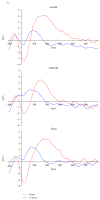The Modulation of Error Processing in the Medial Frontal Cortex by Transcranial Direct Current Stimulation
- PMID: 26317086
- PMCID: PMC4437259
- DOI: 10.1155/2013/187692
The Modulation of Error Processing in the Medial Frontal Cortex by Transcranial Direct Current Stimulation
Abstract
Background. In order to prevent future errors, we constantly control our behavior for discrepancies between the expected (i.e., intended) and the real action outcome and continuously adjust our behavior accordingly. Neurophysiological correlates of this action-monitoring process can be studied with event-related potentials (error-related negativity (ERN) and error positivity (Pe)) originating from the medial prefrontal cortex (mPFC). Patients with neuropsychiatric diseases often show performance monitoring dysfunctions potentially caused by pathological changes of cortical excitability; therefore, a modulation of the underlying neuronal activity might be a valuable therapeutic tool. One technique which allows us to explore cortical modulation of neural networks is transcranial direct current stimulation (tDCS). Therefore, we tested the effect of medial-prefrontal tDCS on error-monitoring potentials in 48 healthy subjects randomly assigned to anodal, cathodal, or sham stimulation. Results. We found that cathodal stimulation attenuated Pe amplitudes compared to both anodal and sham stimulation, but no effect for the ERN. Conclusions. Our results indicate that cathodal tDCS over the mPFC results in an attenuated cortical excitability leading to decreased Pe amplitudes. We therefore conclude that tDCS has a neuromodulatory effect on error-monitoring systems suggesting a future approach to modify the sensitivity of corresponding neural networks in patients with action-monitoring deficits.
Figures




References
-
- Coles M. G. H., Scheffers M. K., Fournier L. Where did you go wrong? Errors, partial errors, and the nature of human information processing. Acta Psychologica. 1995;90(1–3):129–144. - PubMed
-
- Falkenstein M., Hielscher H., Dziobek I., et al. Action monitoring, error detection, and the basal ganglia: an ERP study. NeuroReport. 2001;12(1):157–161. - PubMed
LinkOut - more resources
Full Text Sources
Other Literature Sources

